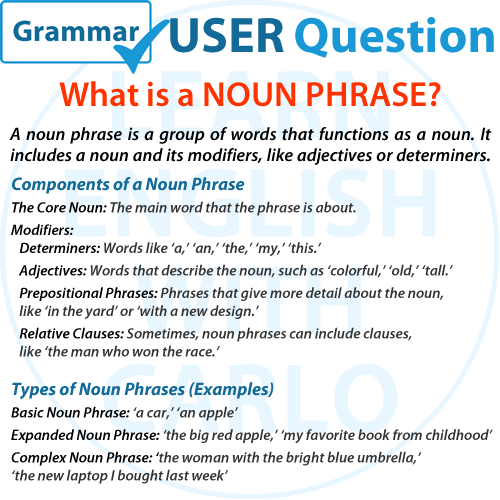When you’re learning English, understanding the structure of sentences is essential. One important part of many sentences is a noun phrase. In this post, we’ll break down what noun phrases are, how they’re used, and give you some examples to help you recognize and create your own.

What Is a Noun Phrase?
A noun phrase is a group of words that functions like a noun in a sentence. It includes a noun (the main part of the phrase) and can also have other words that give more information about that noun. These additional words might include articles (a, an, the), adjectives (describing words), or other elements like determiners, prepositional phrases, or quantifiers.
In simple terms, if you can replace a group of words with a single noun or pronoun and it still makes sense, you’re likely dealing with a noun phrase.
Basic Structure of a Noun Phrase
A noun phrase typically follows this structure:
- Determiner (e.g., the, a, some, my)
- Modifier(s) (optional) – can be adjectives or other descriptors
- Noun (the main word in the phrase)
- Additional Modifiers (optional) – often prepositional phrases or other descriptors following the noun
Example:
- The tall building (Determiner: The, Modifier: tall, Noun: building)
Examples of Noun Phrases
Here are some examples to show how noun phrases look and work:
- A lovely sunset
- A (Determiner), lovely (Adjective), sunset (Noun)
- The little boy in the red shirt
- The (Determiner), little (Adjective), boy (Noun), in the red shirt (Prepositional phrase as additional modifier)
- Some fresh vegetables from the market
- Some (Quantifier), fresh (Adjective), vegetables (Noun), from the market (Prepositional phrase as additional modifier)
- Her big blue book
- Her (Possessive Determiner), big and blue (Adjectives), book (Noun)
Why Are Noun Phrases Important?
Noun phrases help us add detail and description to our writing and speaking. Instead of just saying “cat,” a noun phrase allows you to say “the fluffy white cat on the windowsill,” which paints a clearer picture for the reader or listener.
Types of Noun Phrases
Here’s a quick look at different types of noun phrases based on the words they include:
- Simple Noun Phrase: Contains just a noun and possibly a determiner.
- Example: The book
- Expanded Noun Phrase: Includes adjectives or prepositional phrases for more detail.
- Example: The old, leather-bound book on the table
- Complex Noun Phrase: Includes other elements like quantifiers, possessives, or additional phrases.
- Example: Several of her favorite science-fiction novels from the 1980s
How to Identify a Noun Phrase
When you’re reading or writing, you can spot a noun phrase by looking for a group of words that functions as a single noun in the sentence. You can test this by replacing the noun phrase with a pronoun (like “it” or “they”) and seeing if the sentence still makes sense.
Example:
- Original sentence: “The beautiful garden behind our house is full of flowers.”
- Test: “It is full of flowers.”
Since “The beautiful garden behind our house” can be replaced with “it,” we know it’s a noun phrase.
Using Noun Phrases in Sentences
Noun phrases can be used in various parts of a sentence:
- As the subject: The main “actor” of the sentence.
- Example: The young girl in the yellow dress danced gracefully.
- As the object: The noun phrase that receives the action.
- Example: She bought a bouquet of fresh flowers for her friend.
- As the complement: Provides more information about the subject or object.
- Example: The best part of the day was our long walk by the beach.
Warm Up Exercises
To help you recognize noun phrases, try underlining the noun phrases in these sentences:
- The bright red car sped down the road.
- She found an old coin from ancient Rome.
- Several people in the crowded restaurant looked over at us.
See below for a multiple-choice Noun Phrase Exercise
Key Points to Remember
- A noun phrase acts as a noun in a sentence and includes a noun plus any modifiers.
- Noun phrases can add detail, description, and context to sentences.
- Look for a main noun and think about whether the phrase could be replaced with a pronoun to check if it’s a noun phrase.
By practicing with noun phrases, you’ll be able to add more detail and clarity to your sentences in English. Try writing a few of your own noun phrases, and see how descriptive you can be!
